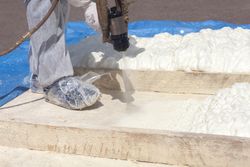A Guide to Closed & Open Cell Spray Foam Insulation

Spray foam insulation is excellent for lowering energy bills and keeping your home comfortable throughout the year. Both of the main types of polyurethane spray, closed cell and open cell, provide unique advantages. Below is a helpful guide on the differences between these two products.
Which Kind of Insulation Is Better?
Closed Cell
 Many contractors use closed cell foam insulation because of its high-efficiency ratings. It is resistant to heat flow and has the highest R-value of all commercial insulation products, measuring at approximately 6.0 per inch. Closed cell spray foam insulation contains gases within the polyurethane, which contributes to its energy efficiency. These materials also resist water and moisture, preventing humidity within the home. Overall, closed cell insulation is strong, dense, and will even reinforce the walls of your property.
Many contractors use closed cell foam insulation because of its high-efficiency ratings. It is resistant to heat flow and has the highest R-value of all commercial insulation products, measuring at approximately 6.0 per inch. Closed cell spray foam insulation contains gases within the polyurethane, which contributes to its energy efficiency. These materials also resist water and moisture, preventing humidity within the home. Overall, closed cell insulation is strong, dense, and will even reinforce the walls of your property.
Open Cell
Open cell spray foam insulation has an R-value of about 3.7 per inch. Its lower density usually makes it a more economically feasible option. However, it does not resist moisture or air flow as effectively as closed cell products. One of the biggest advantages of open cell spray insulation is its ability to cancel outdoor noises and keep properties quiet. However, this material is not ideal for homes in climates that experience dramatic temperature fluctuations. Contractors typically recommend closed cell insulation as the better long term investment.
Danner Spray Foam offers dependable spray foam insulation to clients throughout the Syracuse, NE, area. Since 1995, these contractors have provided insulation products and services for attics, ceilings, basements, garages, pole barns, and other agricultural, commercial, and residential spaces. Known for their customer service, they have an A+ rating from the Better Business Bureau®. Call (402) 269-7058 to set up an appointment for spray insulation services and request an estimate. Visit them online to learn more about their family-owned and -operated business.
About the Business
Have a question? Ask the experts!
Send your question

